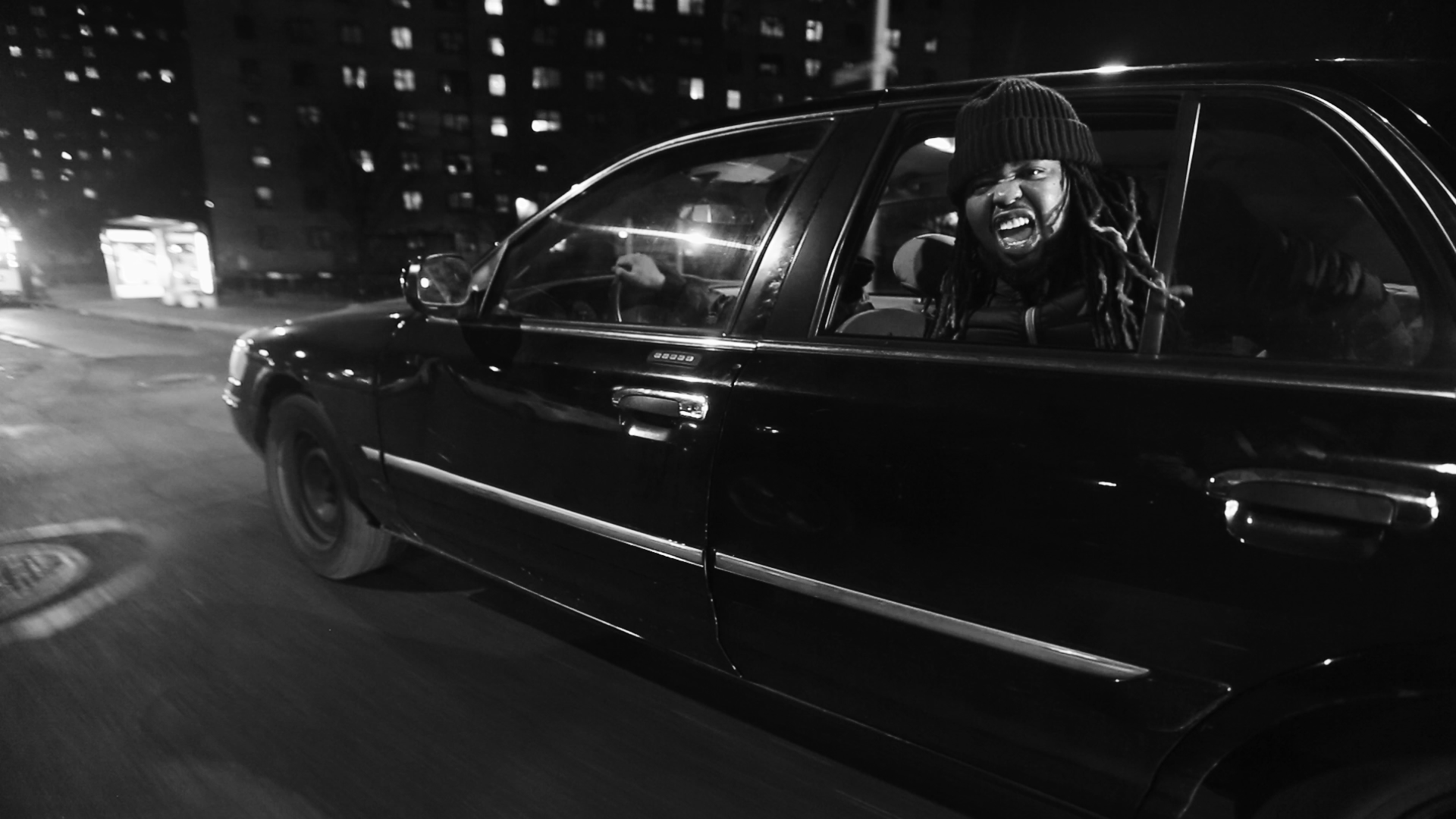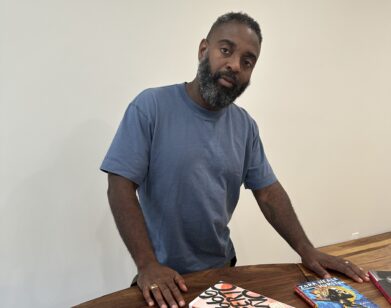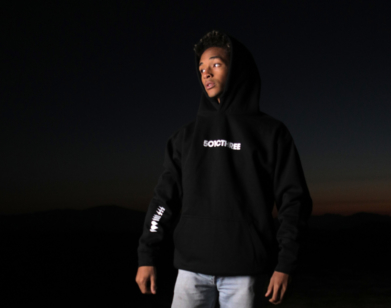Meet the Woman Behind Die Jim Crow, A Record Label for Incarcerated Musicians

Photo by Dave Jones.
BL Shirelle is a lot of things— a Philadelphia native, a lesbian, a survivor of police violence, a community advocate, a formerly incarcerated person, a writer.
She’s also the Deputy Director of Die Jim Crow, the first non-profit record label for incarcerated and formerly incarcerated musicians. Under Shirelle’s guidance, artists and producers representing Die Jim Crow travel to prisons across the country to record with incarcerated artists. Die Jim Crow’s mission is personal to Shirelle. By the time she was 17, she had found herself in multiple courtrooms as her mother’s co-defendant, and at 18 was sentenced to ten years in a Philadelphia prison. “Pretty much everything you’d imagine happening to the child of a crack addict in the nineties,” she says, “well, it all happened to me.” But this year is special. Shirelle is off parole, and her first album, Assata Troi (which means “she who struggles is a warrior”), is out June 19. “Now I’m 32, and this is the first time since I was twelve that I’ve been truly free,” she says. “No parole, no supervision, nothing.”
A self-proclaimed music geek who counts Nirvana, The War on Drugs, Nas and countless others among her influences, Shirelle’s upcoming album draws on equally disparate genres, from the smooth R&B intro on “U Only Tell Me” to the dark, rock-inflected instrumentation on “Conspiracy.” Consistent across the album is Shirelle’s deep commitment to crafting nuanced depictions of her experiences with the American prison system through devastating lyrics. “SIGS,” the album’s first single, paints a seething picture of the cycles of intergenerational recidivism laced with palpable angst and frustration: “I’m addicted to the digits/ they’re addicted to syringes/ common sense is that we must conduct some business.”
Since her release, Shirelle has pulled together a strong community of women who support one another in countless situations where the American criminal justice system fails the formerly incarcerated. “These are the women I grew up with,” she says. “From 18 to 28, we went through the same things.” These days, when she’s not at her full-time job, she supports this adopted family by raising money to send personal protective equipment into Philadelphia prisons and to provide pandemic relief to her community on the outside. We spoke to Shirelle on her day off to learn more about Assata Troi, the mission behind Die Jim Crow, and the underrated musical stylings of Jaden Smith.
———
MARA VEITCH: Where are you right now, and how have you spent your day?
BL SHIRELLE: I’m born and raised in Philly, and that’s where I am right now. Today’s my day off, I still work a regular job, so I spent the day doing pandemic relief work in our community.
VEITCH: How would you describe your community?
SHIRELLE: We’re a huge number of formerly incarcerated women. We stick together for a lot of different things. If anybody needs a job, needs housing, needs pandemic relief. That’s pretty much how I spend my days off. We’re always bartering our skills and our connections and making sure that we’re taking care of each other. I know that sounds like super women being super great, and it is, but it’s tiring. [Laughs].
VEITCH: That’s a form of family and a form of work, too. It sounds like you’re saying that the support organizations for formerly incarcerated women on the outside aren’t effective.
SHIRELLE: Absolutely not. Because at the end of the day, the only people who can really help us in the way that we want to be helped are people who have been through the same situation. Because we grew up in prison. So, all the people I did those ten years with, from 18 to 28, we are out here, and we are the driving force for the kind of change that we’re trying to cultivate. You know what I mean? A lot of us really wanted to be better, we all worked tirelessly to have some semblance power, as G.M.s at our jobs, and that created a really cool network for all of us. We can provide whatever is needed amongst each other. That has been the most important thing for me on the outside. We didn’t set out for this, but once we were out we just formed this community.
VEITCH: Can you share a moment when that network came through for you?
SHIRELLE: So, my wife is also formally incarcerated— she’s the number-one optician in Philadelphia. During the riots last week, she had to close all her stores down, and didn’t want to open back up without armed security. All I had to do was call this friend whom we did many years with and say, “Hey, we’re looking for security please, this is our budget, blah blah.” She’s like, “Stand by. I’ve got you.” That’s how we all operate.
VEITCH: How did you meet your wife?
SHIRELLE: We met in the penitentiary. I met her in 2008. We’ve been together for almost 13 years now. We’ve been through a lot. We went back to prison together. Totally my fault, she had nothing to do with it. She was just on parole, and her being on parole and being with me and me committing a crime put her back in prison.
VEITCH: That’s a lot for both of you.
SHIRELLE: Yeah, it is. She cut glasses for every incarcerated person in the state of Pennsylvania while we were inside. That was her job. And now, she is literally the number-one optician in Philadelphia, our city.
VEITCH: You’re doing amazing things in such different lanes.
SHIRELLE: Yeah, totally different lanes. She’s amazing. I’ve watched her take one store and turn it into three stores, soon to be four stores. She’s literally building a franchise on her back coming from learning the trade in prison. I take notes from her daily.
VEITCH: Do you remember the first lyrics you wrote?
SHIRELLE: I’ve been writing lyrics since I was six or seven. My teachers published my poetry in the second grade, and I was very into poetry contests and stuff like that, going up against 12th graders. Sometimes I reread that stuff and I’m like, “Hey, you were eight years old and really fucking good.”
VEITCH: Sounds like you were a bit of a phenom.
SHIRELLE: [Laughs] Yeah, I used to win. The first rap that I remember writing was when I was around six, and it goes— this sucks, so no judging—”Back in the day in ’91, we used to have fun, just chilling in the hot sun.” Then it went, “We used to get a dollar and think we was rich, but all we could really get was some stupid Swedish Fish.” That was it. It’s so funny, because I was literally two or three in ’91.
VEITCH: I can’t believe you were six.
SHIRELLE: I wrote the second verse of “Til I Go,” from the album, when I was 14 or 15. Of course, I tweaked it to make it more current. But sometimes I look back like, “Wow, you was better then!”
VEITCH: Is writing lyrics something that’s always been therapeutic for you, or is it something you found your way back to once you got your life back?
SHIRELLE: I’ve always done it for therapeutic purposes, I never intended to make a career out of it. I didn’t have the best life growing up, things were very dark. By the time I was maybe 12 or 13, I was selling crack to my mom, and this was perfectly normal to me in my world. You normalize things so quickly at that age, but I must have known somehow that, of course, this wasn’t a normal situation. So I needed that outlet. And dealing drugs at that time probably helped me to learn a lot at a very young age. I used writing my whole life to, I don’t know, just let it out somehow.
VEITCH: It sounds like you’re saying that some part of you, the artist part of you, felt that there was a story that should be told.
SHIRELLE: Yeah. As a teenager, I wrote songs for everyone in my family. When I went back and read the stuff about my mom and my aunt, I saw that I had a lot of anger and resentment and blame to throw around. I now understand that, as a kid, I had every right to feel those things, but I was also smart enough to know right from wrong. So I was conflicted, because I just wasn’t disciplined enough to say, “Oh, my mom’s not making me go to school, but I know school’s the right thing, so I’m going to go anyway.”
VEITCH: Who did you look up to at that age?
SHIRELLE: I had some strong people in my life. I found the song I wrote for my grandmom, she did tell me to go to school all the time. You’ve got one person telling you one thing, but you’re seeing another thing every day. I was able to find my responsibility and my accountability as I got older, when I look through those writings.
VEITCH: You’ve said that this album is about owning past pain and finding ways to turn it into power. Can you explain that?
SHIRELLE: I think that once you’ve been through it, and once you’ve identified the culprits or the situations that may have caused you to make bad decisions in your life, then it’s time to own up. A lot of us grow up too fast. We’re used to being in control and being independent and looking out for ourselves, and it’s hard for us to ask for help.
VEITCH: What’s an example of that?
SHIRELLE: When I got out of prison in 2011, there were no payphones anymore, just cellphones. I was living in a halfway house, and if you were running late, you had to call and let them know. I didn’t have a cell phone, and I remember being ashamed to ask a person on the street to use their phone—not because I didn’t want to ask for a favor, I was willing to pay them and everything— because I didn’t know how to use the phone. I couldn’t stand to go through the process of explaining why I don’t know how to use this new kind of phone, you know what I mean? Like, do I say I was in a coma for the past ten years and I just woke up? That was such a small example, so you can imagine how hard to ask for help with bigger things. We have to learn to do that, look in the mirror at our strengths and weaknesses.
VEITCH: How did you find your way to Die Jim Crow?
SHIRELLE: I hate telling the story, because I did a horrible performance for TEDx in the penitentiary.
VEITCH: That’s so cool.
SHIRELLE: It is until you realize that the fucking D.O.C. is forcing you to do it in a very specific way. At the end of the day, I stand by what I said, but it’s just the censorship of it all. I would never even take that opportunity now.
VEITCH: It makes sense, but it didn’t occur to me that they could censor what you wrote.
SHIRELLE: Oh yeah, they tore my shit up. But I did it. It was this very cheesy, Nickelodeon-type deal. I had a band called BL Shirelle. I was the writer, arranger and I played guitar while my friend rapped. It was really some makeshift stuff, but my now-producer Fury saw the performance. He was working on this album called “Die Jim Crow,” about mass incarceration. So, we just started writing. I was so instantly inspired, I wrote so many of the songs on the album while I was inside. When I came home, we recorded them.
VEITCH: So you took this from a concept album to a record label.
SHIRELLE: Yes. There was a lot of artists who had songs that didn’t fit the concept, but they were still really good. So we expanded the organization. We’d built a bond with so many musicians and producers inside. We write them. They write us. They love us. We love them. We literally are a family, so I guess that’s what made the record label, yeah.
VEITCH: How would you describe the mission of Die Jim Crow today?
SHIRELLE: Every musician that we work with is currently or formerly incarcerated. All we want to do is produce great music by talented artists who deserve to be heard—whether they’re on the inside or the outside. We do have some people who committed very heinous crimes, but we focus on their character today, not the person they were 30 years ago. If you’ve got the goods, we want people to hear you. Of course, I want people to understand that we fight for a good cause, yada yada, but really, we just make great fucking music. Seriously, we don’t come out half-ass. We take pride in how our stuff look, how our stuff sound and the quality of it all.
VEITCH: During those ten years, how did your musical influences change?
SHIRELLE: Well, it’s a curse since I’m such a music geek. People may think music has changed a lot since the early 2000s or mid-90s when I went in, but I could point out 20 different stupid-ass songs out now that we basically had on the radio then. I’ve always been into a lot of different genres. There was a lot of white girls in some of the places I was in, and I liked to explore music outside of my culture, just so I could be aware. Or maybe because I was seeking some type of approval, I really don’t know. But I ended up loving a lot of the shit that I found, like Nirvana, Soundgarden, then later on Alabama Shakes and The War on Drugs. I love all that shit. But these days I mostly listen to R&B.
VEITCH: What other artists are you looking to right now who are blurring genres, prioritizing lyrics, and sending a strong message in the way that you do?
SHIRELLE: Jaden Smith. I think people sleep on him a lot. He’s one of those artists who can fit a big message into a melody, but he can also get a little spoken wordy. J. Cole can also do it when he wants. He appreciates being outside of the box most times, but he can get in his box when he wants to build a catchy melody.
VEITCH: Tell me a bit more about the music video for “SIGS,” which you released recently. It’s full of images—crime scene photos, diary entries, all kinds of things. How did that video come together?
SHIRELLE: We shot a bit for the video, then COVID-19 took over before we had everything we needed. So we edited it to include a lot of the imagery we wanted the song to evoke. It’s very reminiscent of the ’90s, the late ’80s when crack was introduced. There are a few images, like the picture of me in the sky surrounded by clouds, that draw on the t-shirts people wear in my culture after someone has passed on. “SIGS” stands for “shit I gotta say,” These images may give you doomsday feels. It’s grimy, it’s dirty down here, it’s survival mode. But in the end of the video, like I said, when you see the beach and the footsteps in the sand, you get this feeling that something is going to come from all of this.
VEITCH: How do you want people to feel when they’re listening to your music?
SHIRELLE: Honestly, I just want them to hear it. I make good music. I make great music sometimes, and I want people to feel whatever it makes them feel. Sometimes when people see me or hear my music they do feel uncomfortable, and that’s okay too, because it tells you that you should maybe take a look at yourself.
VEITCH: Is there anything else you want our readers to know?
SHIRELLE: Well, given this whole George Floyd situation on top of everything else, I just want to say that of course Black lives matter, I think that goes without saying at this point. As a survivor of police brutality— I was shot by the police multiple times and beaten while in handcuffs —I had the opportunity not only to live through it, but fight back and live through it. It gives me a feeling of survivor’s remorse and mental trauma, every time I see this stuff, but also a sense of responsibility. I just urge everyone to continue to fight. I’m really proud, because COVID was stressing me for a few weeks, but I finally managed to shake all that mental trauma—of the pandemic and police brutality— and was brave enough to step outside the other day. We had this P.P.E. benefit and we sent over 10,000 masks to eight prisons in seven states. But this is a fight that we have to continue to fight. Don’t let the thought that it’s not trending no more, or that people aren’t looting no more, stop you from continuing to be about the fight. Serious.




